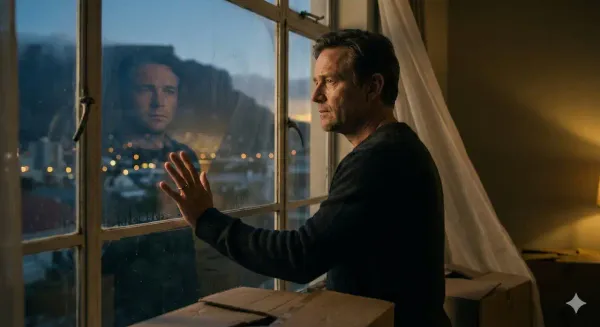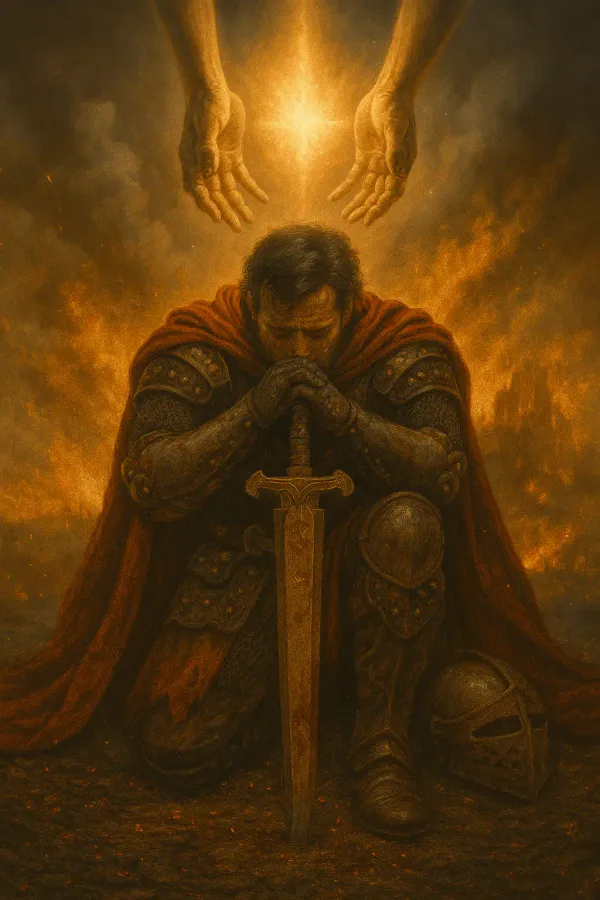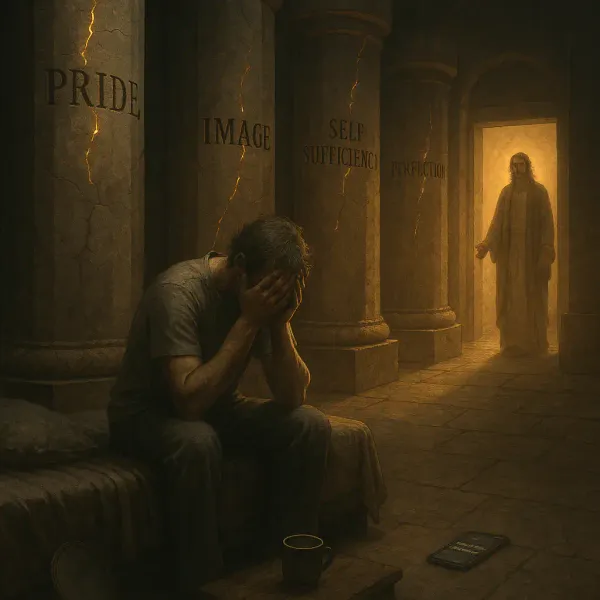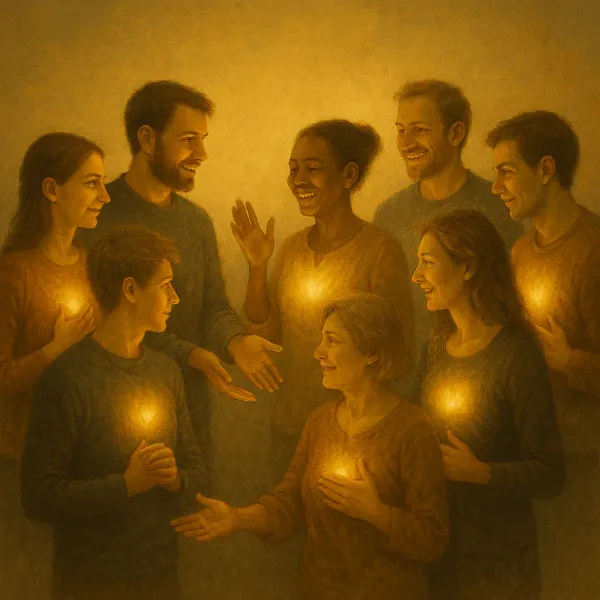The Chisel and the Pyramid
You weren’t made to scroll past your own life. In a world numbing you into automation, the quiet ache you feel is the evidence you’re still human. Stay. Attend. Love with your presence. It’s not performance that changes you—it’s choosing to stay when it would be easier to ghost.
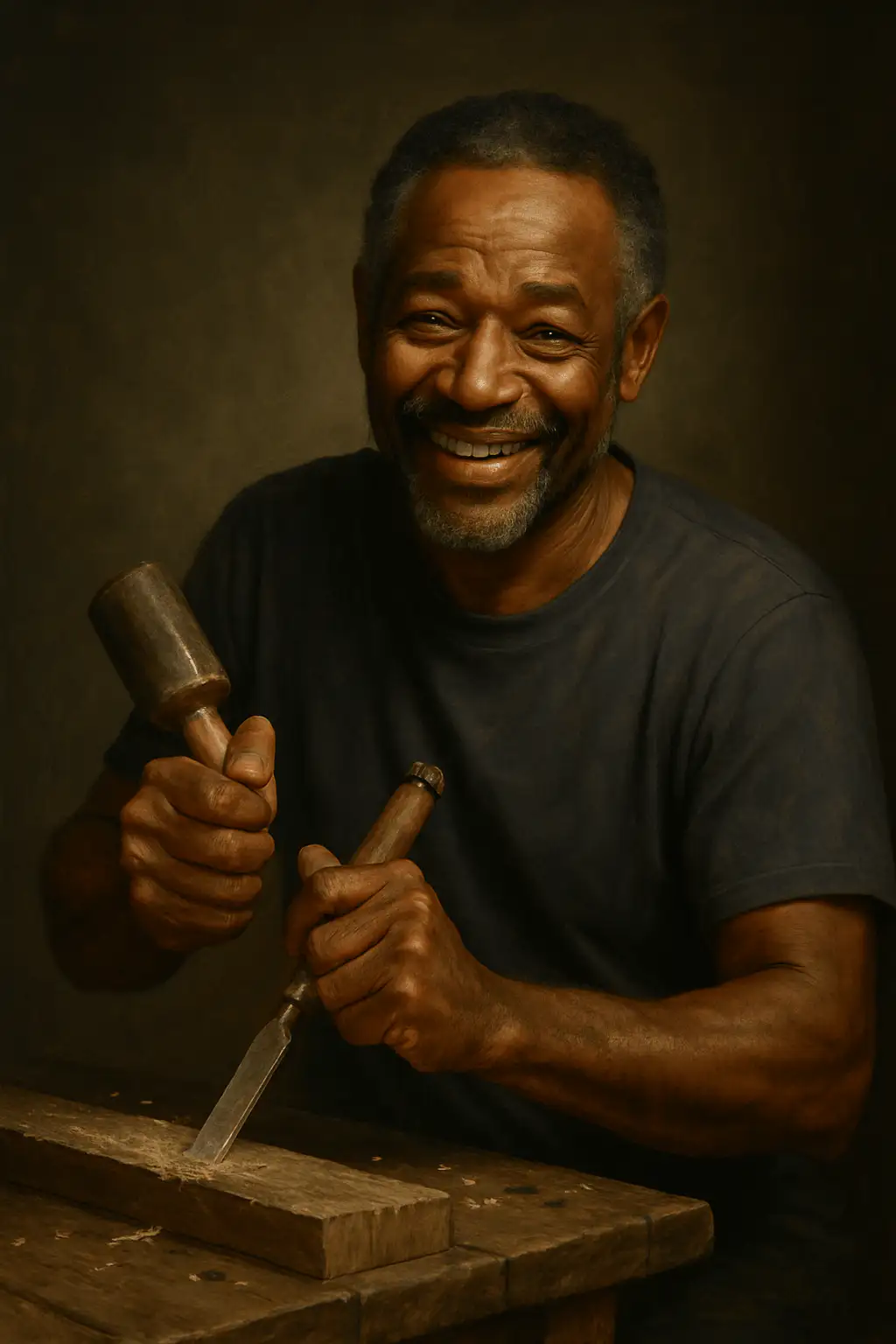
Algorithms fan distractions, but we wield the chisel. Stay. Struggle. Become. Christ wept before raising; He lingers in your wilderness.
When I was a young boy, my grandfather would take me into his workshop. A quiet, sawdust-scented space where things were made slowly, with hands and intention. He was a carpenter in the old way—no shortcuts, no mass production. Just wood, tools, and time.
He taught me how to sharpen a chisel. Not just how to make it cut, but how to feel when it was ready. The angle of the blade. The pressure of the stroke. The way the metal slid and dragged across the watered whetstone. Then came the work itself—aligning grain, anchoring the wood, guiding the blade with steady hands. Measure twice. Cut once. Test, adjust, repeat. We’d spend hours like this—not rushing, not distracted. Just two humans, one older and one younger, paying attention.
One day, we crafted a puzzle together—a multidimensional wooden cross, another time a cube. Pieces that looked random, but fit together precisely if you understood the form. Years later, I’d forgotten about those puzzles.
Until the day I was unknowingly interviewed.
I was doing some contract design work for a company, and one morning the boss—someone I hadn’t really spoken to—invited me to his home. I thought it was just a get-to-know-me coffee. Instead, he dumped a bag of wooden pieces on the table and said, “These assemble to form a pyramid. Back in ancient Egypt, they used this to decide who would be leaders. Five minutes to solve it—and you’re in charge. Fail, and you’re hauling stone.”
Then he left to make coffee.
I looked at the pieces. My hands knew what to do before my mind caught up. In under three minutes, the pyramid stood finished on the table. He came back, saw it, and said, “Well done. You’ve got the job.” I blinked. “I didn’t know I was being interviewed.” He smiled, “Oh, but you were.”
That puzzle, that moment—it was built decades earlier in a quiet workshop with my grandfather. A skill passed down. But more than that—a way of seeing, a way of being. Focused. Attentive. Human.
The Sacred Act of Staying
Staying, persevering—this is where all real becoming begins.
Friction isn’t failure. It’s the forge. The resisting edge of the chisel against grain, the repeated movement on the stone, the patient building of puzzles by hand. These are not relics of a past age. They are echoes of our design.
Scripture tells this story again and again:
That the wilderness teaches.
That suffering refines.
That the promised land was given little by little, “lest the beasts become too numerous for you” (Deuteronomy 7:22).
That mastery, in God’s economy, is not instant. It’s formed through attention.
And Christ Himself modelled this—again and again.
He stayed in the tension.
He went out of His way—geographically and culturally—to meet the Samaritan woman at the well (John 4).
He delayed coming to Lazarus, not out of neglect, but because glory required waiting—and when He arrived, He didn’t rush to fix it. He wept (John 11).
He paused for the woman with the issue of blood, even while being pressed by a crowd (Luke 8).
He remained with the adulterous woman after the stones dropped, offering neither condemnation nor departure (John 8).
He cooked breakfast for a devastated Peter—three denials answered not with rebuke, but with a fire, a meal, and a gentle restoration (John 21).
He didn’t just teach.
He lived, demonstrating conscious focussed attention.
Fully. Lovingly. Present.
Focused attention, rightly given, is not just a human trait—it is a Christlike one.
Still, staying and persevering can feel dangerous. For some, it awakens the fear of falling short—again. For others, it brings back memories of being demanded, not loved. Some want to press in, but feel invisible when they do. Others are tired of trying, having stayed with hope once and watched it disappoint. Some want to be real, but don’t know how to stay if no one’s watching.
And yet—this is still the place where we become.
The Resistance of Attention
In a wilder world, attention meant life. Miss the lion in the grass, the scorpion in your shoe, the stranger at the edge of the village—and you didn’t survive. You had to see, to sense, to stay present. And your presence didn’t just protect you—it protected the tribe.
Because you weren’t just an individual.
You were a part of something larger than you.
A brother. A mother. A shield. A keeper.
Your attention was for others. Your contribution mattered. And if you became impossible to live with—if you couldn’t adapt, apologise, stay present—you weren’t cast out for drama. You were cast out because survival was at stake.
But now?
The wild has been paved. The city walls are high.
The predators are no longer outside—they’re in your pocket.
And what was once a shared attention has become an algorithmic mirror.
We are trained to look inward, downward, screenward.
The tribe has become the town.
The town, a city.
And the city—a stream of endless personal bubbles.
“In those days there was no king in Israel; everyone did what was right in his own eyes.” —Judges 21:25 (NASB95)
That’s not a liberty hymn.
It’s a sorrow song.
And we are living it again—this time with high-speed WiFi and curated feeds.
And to the ‘sorrow song’, what follows is a lyrical adaptation of Simon and Garfunkel’s haunting ballad “I Am a Rock.” The original is a masterpiece worth sitting with. Here, we echo its spirit for the algorithmic age…
⸻
A winter’s scroll
In a deep and digital December;
I am alone,
Watching stories flicker on a screen below—
A thousand lives I do not know.
I am a ghost,
I am a post.
I’ve built walls,
Not stone but silence,
swipe and signal,
That none may breach.
I have no need of friendship;
replies delay the feed.
It’s laughter and it’s longing I mute.
I am a mask,
I am a pose.
Don’t talk of love—
I’ve seen the captions, heard the vows.
They sleep inside the archive now.
I won’t disturb the ache of what has died.
If I never stayed,
I never had to try.
I am a voice,
I am a void.
I have my apps
And algorithms to protect me.
I am shielded in my avatar,
Curating my persona,
safe behind my glow.
I touch no one and no one touches me.
I am a flicker,
I am a blur.
And a ghost feels no pain.
And a post never cries.
But you do.
You feel the phantom ache of scrolling past your own life. You know what it costs to choose presence when performance feels safer. And in that knowing—in that capacity to hurt, to hope, to hesitate—lies something the algorithm cannot replicate. The human struggle.
The Machine Cannot Struggle
The machine is faster. No argument there.
It can retrieve, remix, refine.
It can sound fluent, even wise.
But the machine does not struggle.
It never second-guesses. Never reworks the same paragraph twelve times unprompted. Which I did writing this post.
It doesn’t feel shame, or the sting of criticism, self-doubt or the slow climb back after failure.
It has no skin in the game.
You do.
You know what it feels like to sit in front of a moment,
heart full of something, but no words that will obey.
You know the tension of a half-finished idea,
the late nights where nothing clicks,
the quiet “maybe I’m not cut out for this” that creeps in around 2 a.m.
You know what it means to wrestle your own attention back from the scroll or screen.
To fight to stay present with your children when your mind wants to check out.
To show up for your spouse when you feel numb.
To keep shaping something real when the algorithm offers ten faster versions.
And here’s what the machine will never have:
your late-night doubts.
your persistent presence.
your tears.
your deep pain.
your choosing to stay anyway.
The machine can output.
But only you can offer yourself.
The machine simulates focus—we live it.
We breathe the smoke. Emerge forged.
This is:
Your act of resistance: staying faithful even when no one claps.
Your bet on beauty: that staying with the work still changes the world.
Your invitation to step off the stage and into the forge.
Your rediscovery of agency: that your attention is yours to give, not theirs to steal.
Your grace-meets-grit: not in one perfect return, but in the sacred, stubborn choice to try again.
Proof of Work, Not Polished Outputs
We used to look to degrees. Titles. Reputations.
But now, in this algorithmic age of digital fog—what we trust most is what’s been lived. What’s been fought for. What’s demonstrably real.
Can you assemble the pyramid puzzle?
Not perfection, but presence.
Not automation, but attention.
This is where your true work lives:
in choosing friction.
in staying long enough with the material—be it code or canvas or conversation—
that it begins to shape you back.
Because every time you say no to the scroll and yes to the struggle,
you’re doing more than creating a product.
You’re forming a soul.
You Were Made for This
Not to float through ease, but to become.
Not to generate endlessly, but to create what matters.
Not to perform, but to participate.
The path of conscious, focused attention is the path of the Carpenter.
It’s the path that remembers the grain of things. The weight of things.
It is how you were formed—and it is how you form others.
So when you feel that pull to check out, remember:
that too is a moment of becoming.
The stakes are real.
Because every act of attention is also an act of love.
And every time you stay, you’re saying:
This matters.
They matter.
I matter.
And I will not become less human just because the world made it easier.
⸻
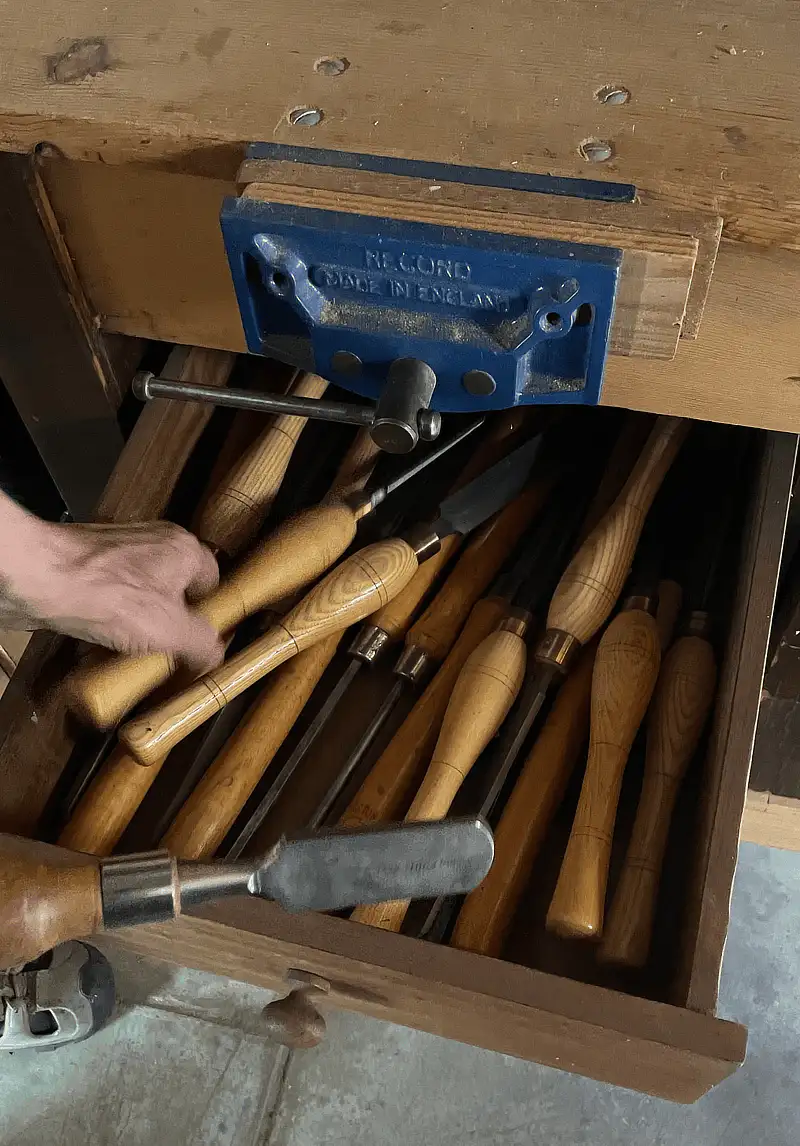
The chisel, the puzzle, the prayer, the code— all of it is your humanity.
What you stay with, stays with you.
And what you give your focused love to
is what will shape you back.
The enemy of your soul isn’t only noise.
It’s numbness.
Because if the machine is shaping you,
you’ll feel it most in what you no longer fight to love.
So when you stay present—
with the silence, the struggle, the person in front of you—
you are saying, with your body and your breath:
I am not a ghost.
I am not a post.
I am here.
I am becoming.
And I will not be shaped by what cannot bleed.
